Moses: From Birth to Sinai
 1 The sixteenth
century BC saw major changes in the Egyptian historical context; the socio-political power of the
emergent seventeenth Theban dynasty increased at the expense of the sixteenth
dynasty of the great Hyksos(1), who saw their sphere of influence
significantly reduced. The Hyksos territory, which once reached Memphis, decreased gradually to the delta of the Nile, and
later, to its western part and the town of Avaris.
1 The sixteenth
century BC saw major changes in the Egyptian historical context; the socio-political power of the
emergent seventeenth Theban dynasty increased at the expense of the sixteenth
dynasty of the great Hyksos(1), who saw their sphere of influence
significantly reduced. The Hyksos territory, which once reached Memphis, decreased gradually to the delta of the Nile, and
later, to its western part and the town of Avaris.
Although in the reign of Rahotep, the first pharaoh of the
seventeenth Theban dynasty, trade and cultural relations with the Hyksos pharaoh
Yaqub-har were good, the geopolitical structure changed significantly when
Heruhirmaat Intef Sekhemre came to

power, and in the reign of his successor
Senakhtenre Ahmose Tao I, the divergences that led to a military clash between
his son Seqenenre Tao II and the pharaoh of the Hyksos Apophis I,
intensified.
In that time, the delta of the River Nile split into seven navigable
branches, the Pelusiac, the Tanitic, the Mendesic, the Bucolic, the Sebenitic,
the Bolbilian and Canopus; the Hyksos reached the Mediterranean Sea through
these waterways, and extended their trade to Crete and Byblos, but with the
reduction of their territory, the Pelusiac branch running through the land of
Goshen, came under the Theban control.

2 Some 130 years
before Thebes
assumed the control of the Gosen land by the grant of a Pharaoh of the Hyksos,
the Israelites settled in the region of Ramses, an area of approximately 2,330
km2, with prosperous and productive fields, and fish laden waterways
inhabited also by hippos, now disappeared. In the book of Genesis we read:
«Then Joseph went to Pharaoh, and said, “My father and
my brothers with their flocks and their herds and all they have, came from
Canaan and are now in the land of Goshen... And Joseph made a place for his
father and his brothers, and gave them a heritage in the land of Egypt, in the best of the land, the land of Ramses, such as Pharaoh had
ordered». (Genesis 47:1 and 11)
The eastern part of the Nile Delta was a strategic zone for the
Thebans, it was an important commercial link with the Asian world and had to be
safeguarded from invasions, so it gradually fell under the control of the
seventeenth dynasty. The Thebans loved the delta area, a place where they
practiced hippo hunting and where the Pharaohs of the XVII and XVIII dynasties
had near the Ramses stores their summer residence to escape the torrid heat of
Thebes. This
residence remained in use until the days of Pharaoh Sethi I of the Nineteenth
Dynasty, before his son Rameses II built there the capital of his
kingdom.
3 After eight
years of Nubkheperre Intef’s rule, his son Sekhemre Heruhirmaat Intef was named
coregent with him, and then started the troubles of the Israelites living in the
land of
Goshen. The book of Exodus
says: «Now a new king who had no knowledge of Joseph,
came to power in Egypt and
said to his people: “Behold, the people of Israel are many
and are stronger than we are. Let us deal wisely, lest their number increases,
and if there is a war, they can also join our enemies, fight against
us and leave the land”. So they put over them overseers for the
forced work, in order to make their strength less by the weight of their work.
And they built store-towns for Pharaoh in Pithom and Ramses». (Exodus
1:8…11) When Sekhemre Heruhirmaat Intef says “our enemies”, he
obviously speaks of their neighbors, the Hyksos.
Some years before, Amram, nephew of Levi, had taken Yocabed, a
daughter of Levi, for wife, and she bore him three children: Miriam, Aaron and
Moses. (Exodus 6:20, Numbers 26:59) Miriam was the eldest, then
came Aaron, and three years after his birth, in 1475 BC, Sekhemre Heruhirmaat Intef enacted
this command regarding the Israelite people: «All
the sons born to you, throw them in the
river, but let the daughters
live» (Exodus 1:22)
That same year, Amram's wife Yocabed, «became with child and gave birth to a son; and seeing that
he was a beautiful child, she kept him secretly for three months. When she was
no longer able to keep him secretly, took a basket made of papyrus reeds, daubed
it with tar and pitch to keep out
the water, and placing the child in it, put it among the reeds along the bank of
the river, while his sister stood some distance away to watch what was going on.
Then, Pharaoh's daughter came down to the Nile to take a bath while her maidens
walked along the riverside, and she saw the basket among the reeds, then sent
her servant-girl to get it. When she opened it, saw the baby crying and took
pity on him, because she said, “This is one of the Hebrews' children”. His
sister said to Pharaoh's daughter, “Would you like me to get you a nurse from
the Hebrew women, to breast-feed the child?” And Pharaoh's daughter said: “Go”,
so the girl went and brought the boy's mother. The daughter of Pharaoh said to
her: “Take the child with you, breast-feed him for me and I will give you your
pay”; so the woman took the child and nursed him». (Exodus
2:2…9)
4 Who was
this “daughter of Pharaoh”?
Senakhtenre Tao Ahmose I, son of Sekhemre Heruhirmaat Intef, had
three daughters from his wife Tetisheri: Ahotep, Ahmose Inhapy, and Sitdjehuti,
called Satibu. Each of the princess received royal titles, and Satibu,
who was the youngest, received three; the first title was that of “Daughter
of Pharaoh”, later she received that of “Sister of Pharaoh”, and
after marrying her brother
Seqenenre Tao II, she also received the title of “Wife of Pharaoh”.
Satibu had no sons from her marriage to Seqenenre Tao II, only one daughter,
Princess Ahmose, so her only son was he who she adopted and called
“Moses” (or “Son” in the Egyptian language), because she said
«I drew him from the waters». (Exodus
2:10)
Scripture says that «Yocabed nursed him,
and when the child grew up, she took him to the Pharaoh's daughter, and he
became to her as a son». We do not know much about Moses’ life in the
period he lived as the son of the princess, but Scripture says that «Moses was instructed in all the wisdom of the Egyptians and
was also mighty in words and deeds». (Acts 7:22)
There are few evidences of the reasons that ended the friendly
collaboration between Hyksos and Thebans, giving way to a resentment that under
the rule of Seqenenre Tao II, culminated in a conflict, but some reveal the
decline of their relationship. A text of the nineteenth dynasty, entitled
“Dispute between Apophis and
Seqenenre”, says that the Hyksos’ Pharaoh Apophis I sent to the
Theban Pharaoh Seqenenre Tao II, a messenger who was well received, but the
message was a bitter complaint, it started like this: «King Apophis sends me on account of the hippos that live
around your city, to say: “Their roar is always in my ears and I cannot sleep
neither day nor night...”» Most of the commentators interpret this
complaint as a provocation from Apophis. In fact, the Theban area was at
600 Km
from Avaris, and besides, there were no hippos in Thebes, as states the Greek historian Herodotus (V century
BC), when describing the “Hippopotamus Amphibius”, writes that in
Egypt, the hippos lived only
on the Nile river delta. Therefore, the hippos were only in the area of Ramses, the place
where the Thebans had their summer residence, and where they hunted them, and
since the town of Avaris was just across Pelusiac branch of the
river, it is obvious that the bellowing of the hunted animals would be heard in
it.
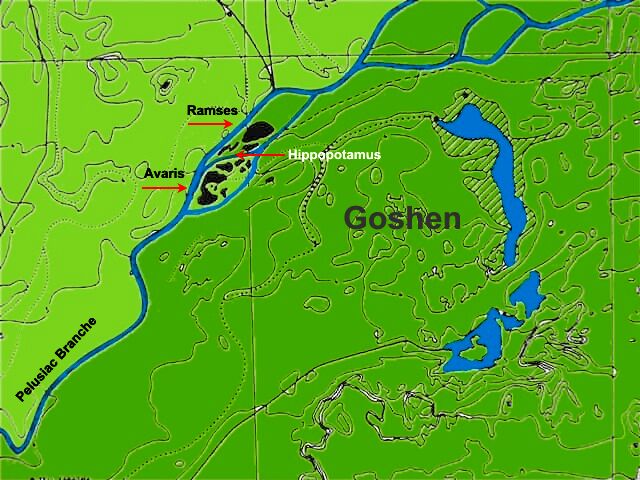
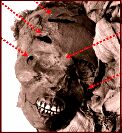 5 Seqenenre
Tao II started a so called “War of Liberation” against the Hyksos, and died
violently in battle by the five serious head injuries that his mummy exhibits.
The kingdom’s succession passed to his brother Kamoses, who against the
advice of his counselors that wanted to restore good business relations with the
Hyksos, went on fighting. After his sudden death, probably by a wound received
in battle, there was a short period of peace that was interrupted in the rule of
Ahmose I, son of Ahhotep, the first wife of Seqenenre Tao II. He
restarted to fight on the eleventh year of his reign and his military expedition
led to the conquest of Avaris; and in his twelfth year, the Hyksos were expelled
from Egypt.
5 Seqenenre
Tao II started a so called “War of Liberation” against the Hyksos, and died
violently in battle by the five serious head injuries that his mummy exhibits.
The kingdom’s succession passed to his brother Kamoses, who against the
advice of his counselors that wanted to restore good business relations with the
Hyksos, went on fighting. After his sudden death, probably by a wound received
in battle, there was a short period of peace that was interrupted in the rule of
Ahmose I, son of Ahhotep, the first wife of Seqenenre Tao II. He
restarted to fight on the eleventh year of his reign and his military expedition
led to the conquest of Avaris; and in his twelfth year, the Hyksos were expelled
from Egypt.
6 Taking
advantage on this war, the Nubians, traditionally allied with the Hyksos’
rulers, revolted; and we know again about Moses, the adopted son of Satibu and
instructed in all the wisdom of Egypt. The historian Flavius
Josephus relates that in this war, Moses held the rank of general, and that in
Ethiopia, he got married to Tharbis,
the daughter of the enemy king Merops, and thus concluded peace. (Judaic
Antiquities, 2nd Book, chapter 10) This fact is
confirmed in the book of Numbers, where we read that «Miriam and Aaron spoke against Moses because of the
Ethiopian woman he had taken, for he had taken an Ethiopian woman in
marriage...» (Numbers
12:1) But in the reign of Ahmose I, Moses' life changed suddenly, Paul
writes: «By faith Moses, when he became a man
(40 years), refused to be named Son of
Pharaoh's daughter; and more than enjoying the temporary pleasure that to remain
in error would have provided him, chose to be mistreated with the people of God,
considering the fact of being despised as God's anointed, as a greatest riches
than the treasures of Egypt, and set his eyes on the reward. By faith he forsook
Egypt without fearing the wrath of
the king, and was persistent, as if he could see He who is invisible»
(Hebrews 11:24...27)
In 1535 B.C. at the age of 40, Moses tried for the
first time the liberation of his people, but as he later says to Yahuh: «the children of Israel did not listen to
me...?» (Exodus 6:12) These words recall his life in
Egypt, and this is what then
happened: «when Moses became a man, went one day to
his people and realized how hard their work was. Then he saw that an Egyptian
was beating a Hebrew, one of his people, so he looked around and seeing no one,
he killed the Egyptian and covered his body with sand. The day after he went
back and saw two Hebrew men fighting, so he said to he who was wrong, “Why are
you fighting with your brother?” But the man told him, “Who made you ruler and
judge over us? Are you going to kill me as you did to the Egyptian?” And Moses
feared, because he said, “It is clear that the thing has been
known”.
When Pharaoh came to know about these things, he sought Moses to put
him to death. But Moses fled from Pharaoh, and went to the land of Midian, where he sat near a water-well.
The priest of Midian had seven daughters that went to the well to fill their
jugs and to water their father's sheep, but some shepherds came and drove them
away; then Moses stood up to defended them, and watered their
flock.
When they came to Reuel, their grandfather, he said, “How is it that
you rushed so and returned still in daylight?” And they said, “A man, an
Egyptian, came and helped us against the shepherds, then he drew the water for
us, and watered the flock”. So he asked them: “Where is he? Why did you let the
man go away? Call him and let him eat the bread”. Moses agreed to stay with the
man, and the man gave him his granddaughter Zipporah». (Exodus
2:11...21)

7 Why did
Moses took refuge in Midian?
Essentially, because the Midianites were distant relatives of him, as
they were descendants of Abraham by his second wife Keturah; the book of Genesis
says: «Abraham took wife again, her name was Keturah,
and she gave birth to Zimran, to Yocsán, to Medan, to Midian, to Ishbac, and to
Shuah». (Genesis 25:2...2)
The Midianite Obab, known also with the honorary title of
“Jethro” or “Excellence”, was the son of Reuel, for we read: «and Moses said to Obab
son of Reuel, Midianite father in law of
Moses... » (Numbers 10:29) and also: «Moses herded the sheep of his father in law Jethro,
the priest of Midian...» (Exodus 3:1)
Obab or Jethro was the family head and according to patriarchal
tradition, was a priest of the Almighty God (שדי
אל, El Shaddai). Neither Abraham nor the Midianites knew the name
of Yahuh (יהוה), these words that God says to Moses confirm it: «I made myself known to Abraham, Isaac and Jacob as the
Almighty God, but I did not reveal myself to them with the name of
Yahuh...» (Exodus 6:3)
Moses remained in Midian, and after shepherding his father in law’s
sheep for 40 years, he who had been “mighty in words
and deeds” and a brave general at the service of Pharaoh, changed and
became «a modest man, the humblest of all men on the
face of the earth». (Numbers 12:3) For this reason, when God sent
him to Pharaoh, to tell him that he must let the people go, he replied: «Who am I to stand before Pharaoh and to bring out of
Egypt the sons of
Israel?» (Exodus 3:11)
And told Him «Oh my Lord! I am a man of few words, as
I was yesterday and the day before yesterday, and also now that you have spoken
to your servant, for I am sober in words and grave in speech». (Exodus
4:10) His modesty made of Moses a man loved by God and appropriate for the
assignment he had been given.
8
In
1495 BCE, the Lord Yahuh sent Moses to Pharaoh. Who was then the
Egyptian pharaoh?
To identify him we need an absolute date connecting our calendar with
the time of the Pharaohs of the XVII and XVIII dynasties, as well as documented
data about the reigning years of each one of them. Starting from the
astronomical event interpreted by some Egyptologists, of the heliacal rise of
Sirius recorded on the back first page of the Ebers Papyrus from the XVIII
dynasty, we can establish an absolute date to connect our dating to the Egyptian
chronology. This papyrus dates the heliacal rise of Sirius on the 9th day of the
3rd month of Shemu, in the ninth reigning year of Djeserkare (Amenhotep
I).
This observation that refers to Waset/Thebes, as pharaoh Amenhotep I
was Theban, permits to date the astronomical event in 1517 BC, and also the
crowning of pharaoh nine years earlier, in 1526 BCE.
The following
lists show the translation of these data.
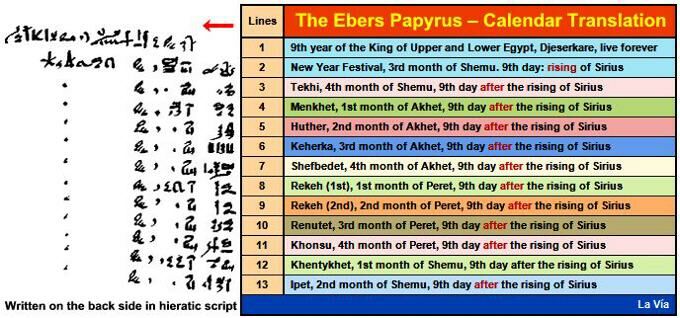
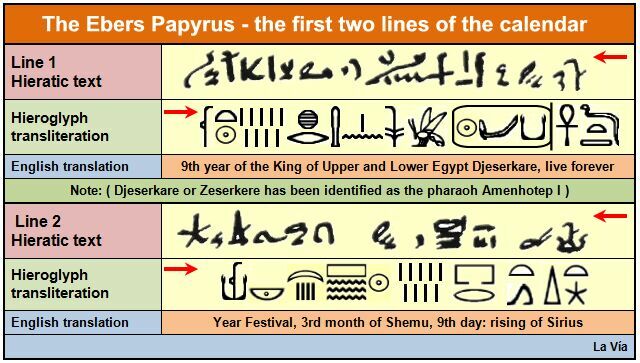
9 Why can we
claim that Amenhotep I came to the throne in 1526, when some
Egyptologists say it was in 1536?
Our calculation is based on the booklet written in
238 A.D.
by the Roman writer Censorinus: De Die Natali. Liber ad Q.
Caerellium, which reports that in the days of consul Antoninus Pius, the
Egyptian year corresponding to the year 139 of our era, began on the first day
of the month of Thoth, and coincided with the “ante diem XIII kal.
Aug.” or July 19th of the Julian calendar (De Die
Natali Liber ad Q. Caerellium XXI, 10).
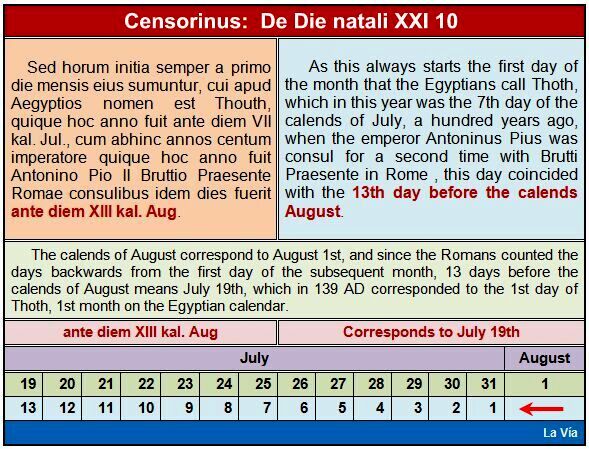
Once established that the place of the astronomical observation
recorded on the Ebers papyrus was Waset/Thebes, the next question is: Where was
the place of the observation mentioned by Censorinus? It certainly was not
Memphis or Waset/Thebes, but the astronomical observatory built upon the famous
Library of Alexandria, that Ptolemy I Soter (367 BC - 283 BC) constructed in 290
BC, and that despite the library fires, remained in function for many years,
because Hypatia, the daughter of Theon of Alexandria, who was mathematician,
astronomer and philosopher, used it until 415 AD, year in which she was murdered
by command of the Catholic Bishop Cyril.
All the collected information permits the dating of the heliacal rise
recorded in the Ebers Papyrus, as follows:

And if Amenhotep I came to power in 1526 BC, the Pharaoh of the
Israelite exodus is Thutmose I, as shown in the table
below.
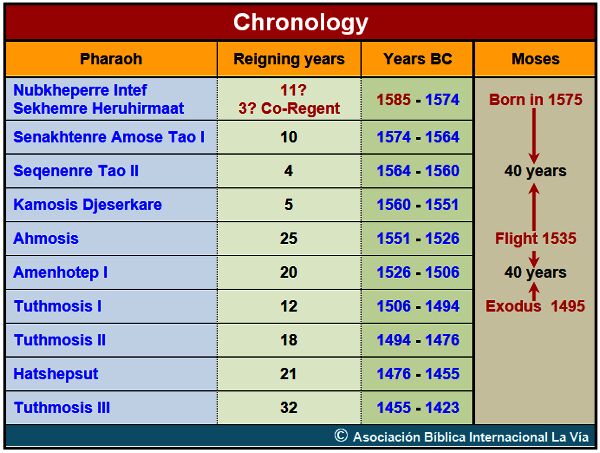
Thutmose I was not of royal descent, his mother Seniseneb is only
mentioned with the title of “Mother of the King”. The way in which Thutmose I
reached the throne in 1506 BC is not very clear, but the legitimacy of his rule
was granted to him by his marriage with Iahmes, identified as “King's Sister”,
and therefore of royal lineage. Queen Iahmes bore him two sons, Amenmose and
Wadjmose, and a daughter named Hatshepsut. Moreover, Thutmose I had also a third
son from the secondary wife Munofret, who at the death of his stepbrothers
reigned as Thutmose II.
The first two sons of the royal wife, had for tutor Paheri, the father of the future mayor of El-Kab.
The firstborn, Amenmose, was educated and prepared for succession, while his
brother Wadjmose was assigned to priesthood, and there is still a shrine of him
in Waset/Thebes. However, the two sons of Iahmes died before their father, who
then named heir to the throne his daughter Hatshepsut.
10 Which was
the place where Moses met with Pharaoh? Certainly not Thebes, at some
600 km
from the Gosen land, but Ramses, in the plains of Tanis (Tsoan) where the Theban Pharaohs had
their favorite summer residence. This fact is supported in the book of Psalms,
where Asaph recalls the mighty works of God on behalf of his people, and
writes:
נֶגֶד אֲבֹותָם עָשָׂה פֶלֶא בְּאֶרֶץ מִצְרַיִם
שְׂדֵה־צֹעַן׃
אֲשֶׁר־שָׂם בְּמִצְרַיִם אֹתֹותָיו וּמֹופְתָיו
בִּשְׂדֵה־צֹעַן׃
«Before his ancestors, He did wonderful things in the
land of Egypt, in the fields of Tanis»
«He sent upon Egypt His signs and wonders on the fields of
Tanis»
(Psalm
78:verses 12 and 43)
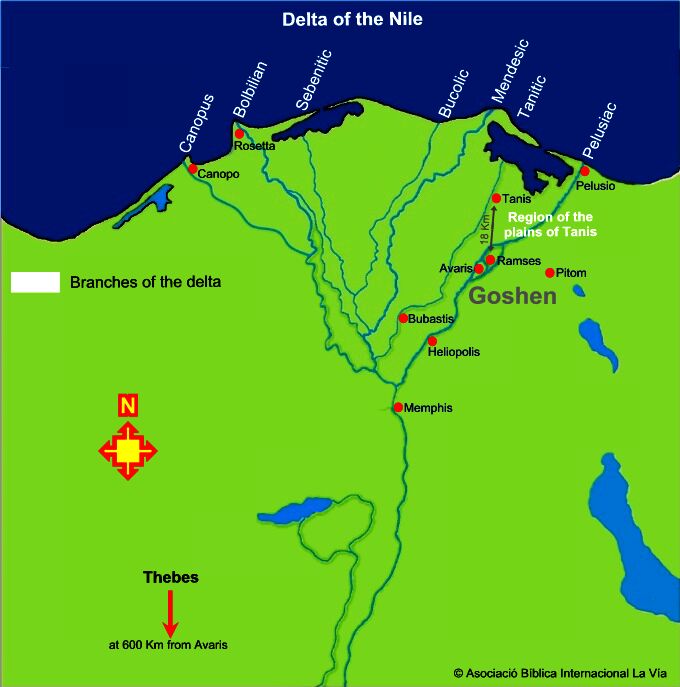
11 When the Lord
Yahuh sent Moses and his brother Aaron to Egypt, He warned
them about the difficulties they would find, and said: «Pharaoh will not listen to you. Then I shall put my hand
against Egypt, and bring out
of Egypt my people, my people
of the sons of Israel, after many hardships. And the
Egyptians shall know that I am Yahuh when I stretch out my hand against
Egypt and bring out the
children of Israel from among them».
(Exodus 7:4...5)
Why does God say «the Egyptians shall know that I am
Yahuh»?
The Egyptian theology consisted of a complex polytheistic system
including 1,500 divinities, linked to each other through a dense net of
relationships. There were gods for all aspects of nature and life, and their
worship was essentially based on magic ritual, since religion and magic were
closely linked. It was therefore essential to demonstrate that these gods were
only a fiction, an illusory human creation, unable to do anything against the
true God, the God who «said to Moses: “I am He who
is”»; (Exodus 3:14) and «I will
confirm my judgment on all the gods of Egypt. I am Yahuh»
(Exodus 12:12)
God was going to make them understand that their gods were useless,
because He is the only living one from ever and forever, and in obedience to the
divine command, «Moses and Aaron came to Pharaoh to
say: This is what Yahuh, the God of Israel, says: “Let my people go and they
will praise me in the wilderness”, but Pharaoh answered, “Who is Yahuh that I
should obey his command and let go Israel? I do not know who Yahuh is and I
will not let Israel go!”» (Exodus
5:1...2)
12 So Egypt came
to know the sentence of Yahuh through the plagues that humbled the main Egyptian
gods, proving their nullity in front of His power.
The first plague was the
transformation of the Nile water and all the waters of Egypt into blood,
demonstrating the helplessness of Nile river god Hapi, to purify himself.
(Exodus 7:19...21)
The second plague was that of
frogs, a fertility and resurrection symbol for the Egyptians, and humiliated the
frog goddess Heket when the Egyptians had to get rid of millions of
rotten frogs. (Exodus 8:5...14)
The third plague proved the
defeat of the priests who practiced magic, for they were unable to imitate it
and turn the dust into mosquitoes through their magic arts. (Exodus
8:16...19) Besides, the god Heka who was the deification of
magic, was not able to make his priests stop the plague.
The fourth plague humbled
Anubis, the guardian of mummification and the dead, and the supposed
controller of flies. (Exodus 8:23...24)
The fifth plague was the
pestilence of cattle, and humbled the heifer goddess Hathor, the bull god
Api and the goddess Nut, represented as a cow with stars fixed on
her breast. (Exodus 9:1...6)
The sixth plague was that of the
pustule sores on people and animals, and it humbled the god Thoth, who
was regarded as having healing power through magic. (Exodus
9:8...11)
The seventh plague was the hail
that fell on people, animals and flora, humiliating the deities of nature and
elements, such as Reshpu, considered the controller of lightning, and
Thoth, who supposedly controlled rain and thunder. (Exodus
9:22...26)
The eighth plague were the
locusts; it humbled all the gods considered as suppliers of abundant crops, such
as the fertility god Min. (Exodus
10:12...15)
The Ninth Plague was the
darkness; it humiliated the solar deities, such as Horus, Ra and
Thoth, considered as the controller of the sun, the moon and the stars.
(Exodus 10:21...23)
The tenth plague was the death
of all the firstborns of Egypt; this was the greatest humiliation for the gods
and goddesses of Egypt, (Exodus 12:12) because the pharaohs were
considered as gods, and as the sons of Ra, Amun Ra, Iah or
Thoth. For this reason, the death of Pharaoh's firstborn was for the
Egyptians, the death of one god.
 13 Who was the
Pharaoh’s firstborn that then died? It
was his son Amenmoses, for a cartridge with his name proves that he was the
crown prince. On the Stella of Thutmose I, dated on the fourth year of his
reign, Amenmoses appears as the crown prince, hunting in the wilderness near
Memphis, next to the Great Sphinx. Besides, Amenmoses was the first prince of
Egypt who received the military title of “Grand Warden of Soldiers”,
usually reserved to Pharaoh and his heir.
13 Who was the
Pharaoh’s firstborn that then died? It
was his son Amenmoses, for a cartridge with his name proves that he was the
crown prince. On the Stella of Thutmose I, dated on the fourth year of his
reign, Amenmoses appears as the crown prince, hunting in the wilderness near
Memphis, next to the Great Sphinx. Besides, Amenmoses was the first prince of
Egypt who received the military title of “Grand Warden of Soldiers”,
usually reserved to Pharaoh and his heir.
The death of all firstborns proved to the Egyptians the futility of
the gods they worshiped, and while the Israelites departed from the land, «the Egyptians buried all their firstborns stricken by Yahuh,
who sentenced their gods». (Numbers 33:4)
14 All these
events began on the spring of 1495 BC and culminated with the tenth plague on
the 14th day of the month of Abib, the full moon day in which by
divine command, the first Passover was celebrated.
Scripture says: «in the land of Egypt,
Yahuh said to Moses and Aaron “This month shall be for you the beginning of
months; it shall be for you the first month of the year. Tell the entire
congregation of Israel that on the tenth day of this month, each family head
must take a lamb; one for every household. If the family is too little for a
whole lamb, a man shall partake it with his neighbor, he who is next to his
house; they shall divide it according to the number of persons, and you shall
make your count for the lamb in regard to what each man
eats.
Your lamb shall be without blemish, a male in the first year; you
shall take it from the sheep or from the goats and you shall keep it until the
fourteenth day of the month; in the evening, the whole assembly of the
congregation of Israel shall kill their lambs, they shall take some of the blood
and put it on the two doorposts and the lintel of the houses where they will eat
it. At night they shall eat the flesh roasted on the fire and the unleavened
bread, with the bitter herbs… and you shall eat it like this: your loins girded,
your sandals on your feet, and your staff in your hand. You shall eat it in
haste because it is Yahuh’s Passover, and in that night I will go through the
land of Egypt and strike every firstborn, both man and beast; because I will
execute sentences on all the gods of Egypt: I am Yahuh… This day shall be for
you a memorial day, and you shall keep it as a celebration to Yahuh throughout
your generations; you shall observe it as an everlasting statute”». (Exodus
12:1…14)
15 When the
Israelites finished their Passover celebration, «in
the middle of the night, Yahuh hit all the firstborns in the land of Egypt, from
the firstborn of Pharaoh, who sat on his throne, to the firstborn of the
confined in prison, and all the firstborn of the cattle. Pharaoh rose up in the
night, he and all his servants, and all the Egyptians, and there was in Egypt a
great lamentation. Egypt was afflicted by a great pain, for there was no house
in which there was not one dead». (Exodus 12:29...30) After
this, Pharaoh «called Moses and Aaron in the night,
and said, “Get up, go out from among my people, you and all the sons of Israel.
Go and worship your God as you wanted to do. Take also your sheep and your
goats, as you have said, and get out! But bless me also”. Egypt urged the people
to leave their land in haste, because they said, “We shall all die”. And the
people took their dough before it was leavened, and loaded on shoulders their
bales wrapped in linen. The sons of Israel did what Moses told them, asking the
Egyptians silver, gold objects and clothing, and the Egyptians provided all they
asked for, because Yahuh had conceded the people the favor of the Egyptians. The
sons of Israel that traveled from Ramses to Succoth were about six hundred
thousand men on foot, aside from the women and children; and there was with them
a large crowd of diverse origin, and many flocks and droves of cattle».
(Exodus 12:31…38)
16 How long did
the Israelites dwell in the land of Egypt? This fact needs to be clarified
through Scripture, for there are several interpretations. Some argue that their
permanence in Egypt was of four hundred and thirty years, basing themselves on
the following words, «The children of Israel dwelt in
the land of Egypt for four hundred and thirty years, and at the end of the year
four hundred and thirty, all of the people of Yahuh left the land of Egypt in
one same day», (Exodus 12:40…41) but others say it was four
hundred years, because of these verses: «Then he said
to Abram, “Know that for four hundred years, your descendants will live in a
land that is not theirs and they will be mistreated and they will be abused, but
I will also judge the nation where they serve, and after this they will go out,
taking with them a great wealth... and at the fourth generation they will return
here, because the Amorites have not yet fully developed their
wickedness”» (Genesis 15:13…16) So, how many were
the years that they remained in Egypt?
17 Firstly we must
understand the meaning of these words: «The children
of Israel dwelt in the land of Egypt for four hundred and thirty
years», which Paul explains when he writes: «the promise was made
to Abraham and his progeny… So I say, a will previously established
by God cannot be declared null through a law which came four hundred and
thirty years later, invalidating thus the promise». (Galatians
3:16...17) And when did Abraham receive the promise? We read: «Yahuh said to Abram: “Depart from your land, from
your relatives and from your father's house, towards the land I will show you,
then I will make of you a great nation; I will bless you and make your name
great, and you shall be a blessing. I will bless those who bless you and him who
curses you I will curse, and through you, all the nations of earth will be
blessed”. So Abram left his house as Yahuh said to him, and Lot went with
him. Abram was seventy-five years old when he departed from
Haran». (Genesis 12:1...4)
18 Now we have
another question; we read that the children of Israel «dwelt in the land of Egypt for four hundred and thirty
years», not in the land of Canaan; how can this be
explained?
It is important to understand what Scripture means by the words
“the land
of Egypt”. The term Egypt that appears in the different versions of
the Bible, is actually the translation of the Hebrew “Mitzrayim”
(מצרים). In the letters of Tell El-Amarna from the first half of the
2nd millennium BC, the land of Egypt is called Mitzri, a name similar
to Mitzr, which is its current Arabic name. In the book of Genesis we read that
«The sons of Cam were Cush, Mitzrayim, Put and
Canaán… Mitzrayim generated Ludim, Anamim, Lehabim, Naftuhim, Patrusim
and Casluhim, who gave rise to the Philistines and the
Caphtorim». (Genesis 10:6,13…14) So
classifies the Philistines as descendants of Mitzrayim through Casluhim,
for this reason they are considered Mitzrayim or Egyptians, and in fact,
everything indicates that Egypt exercised its hegemony over the neighboring
territories, where Abraham and his descendants dwelt as
foreigners.

Paul writes: «Through faith, Abraham obeyed
when he was called, and traveled toward the place he was to receive in
inheritance, and went out not knowing where he was going. Through faith, he
dwelt as a stranger in the land of the promise, living in
tents with Isaac and Jacob, who were heirs with him of the same
promise» (Hebrews 11:8...9)
Now, as we see in this table, from when Abram left Haran at the
age of 75, until Jacob entered the land of Egypt, elapsed two
hundred and fifteen years.
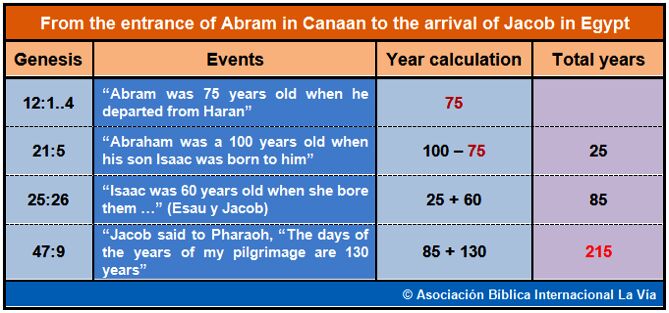
19 How can the
years in Goshen of the sons of Israel be calculated? Subtracting these two
hundred and fifteen years from the total four hundred and thirty, we shall
find the years that the sons of Israel lived in the land of Goshen, on the Nile
Delta. Moreover, Abram is told prophetically about the fate of his descendants:
«at the fourth generation they will return here,
because the Amorites have not yet fully developed their wickedness»,
(Genesis 15:16) and this statement excludes the fact that the Israelites
remained in the Gosen for four hundred thirty years, since this period would
cover far more than four generations. Some words on the book of Numbers about
the parents of Moses, confirm this fact, we read: «The
name of Amram's wife was Yocabed, a daughter of Levi born in Egypt; she bore for
Amram, Aaron and Moses and their sister Miriam»; (Numbers 26:59)
now, this statement excludes a longer period than the remaining two hundred and
fifty years.
The exodus took place when Moses was eighty years old, so if we
subtract 80 to the 215 years, we get the 135 years elapsed between the entry of
Levi in Egypt and the birth of his grandson Moses. This fact is also confirmed
by the historian Josephus Flavius, who on his chronicles of Judaic Antiquities,
2nd book, chapter 14th, paragraph 2, says about the exodus
of Israel: «They left Egypt in the month of
Xanthicus, on the fifteenth moon, four hundred and thirty years after our
father Abraham came into Canaan, two hundred and fifteen years after the
migration of Joseph to Egypt». (Xanthicus = Abib or
Nisan)
20 These words of
Yahuh to Abram, «Know that for four hundred
years, your descendants will live in a land that is not theirs and will be
mistreated, and will be abused», (Genesis 15:13…16) are
perhaps in contrast to what has been analyzed so far? Absolutely not, because
they do not speak the same period. This prophecy foretells two particular
events, the first is: your descendants will live in a land that is not
theirs, and the second is: they will be
mistreated.
Isaac was the first of the seed promised to Abraham, he lived in
Canaan with his father as a foreigner, and was also the first of the
descent to be mistreated. Scripture says: «The child grew and was weaned; Abraham held a great feast on
the day Isaac was weaned, but Sarah saw the son born to Abraham by Hagar the
Egyptian, made scorn of him». (Genesis 21:8...9) In fact,
the 400 years of the mistreat for his descendants began when Isaac was five
years old and Ishmael started to scorn him. Paul understands it so and writes:
«Now brothers, we are children of the promise like
Isaac, and the same as then he
who was born by the will of man persecuted him who was born by the
spirit, happens also today». (Galatians
4:29)
How can we count these four hundred years? Abram was seventy-five
years old when he left Haran and a hundred years old when his son Isaac was
born, (Genesis 12:4, 21:5) for this reason, between the time
in which Abram leaves Haran and the day in which Isaac turns 5, there is a
period of thirty years (100 – 75 + 5 = 30), subtracting these thirty years of
the four hundred and thirty years of the previous prophecy, we can understand
the meaning of the four hundred years period in the second
prophecy.
21 How many
were the sons of Israel that left Egypt? There is not a complete census of
the people who left Egypt on that day, but we know how many the men of Israel
were, since Scripture says that «the sons of Israel
that departed from Ramses toward Succoth were about six hundred thousand men on
foot, besides the children». (Exodus
12:37)
The family of Jacob that entered Egypt, was of seventy persons. We
read: «Jacob left Beer-Sheba. The sons of Israel
carried their father Jacob, their children and their wives, on the wagons that
Pharaoh sent for their journey; and taking their flocks and the possessions
acquired in Canaan, Jacob moved to Egypt with all his offspring».
(Genesis 46:5) From verses 8 to 27 we read all the names of
the male offspring of Jacob, and of two women: Dinah, daughter of Leah, and
Serah, daughter of Asher; verse 26 states: «All the
people that came into Egypt with Jacob were his offspring,
besides the wives of his sons, and they made a total of
sixty-six people»; and if to these sixty-six people we add Jacob,
Joseph and his two sons, the Israelites that settled in Egypt were seventy, as
we read on verse 27: «the sons born to Joseph in Egypt
were two. The total number of the people belonging to the house of Jacob that
settled in Egypt, was of seventy».
So how could it be possible that after two hundred fifteen
years, the Israelites were six hundred thousand adult men, apart
from the elderly, the women and the children?
Let's attempt a calculation: If we take out Dina, Seraj and Jacob
with his twelve sons from the seventy persons, we have 55 men (70-15). Let us
now assume that half of these men (55: 2) = 27 were already old, and as polygamy
was in effect and men could have more than one wife, let us suppose that each
head of household, in their life period between 20 and 40, had an average of ten
descendants, five sons and five daughters, and also, that every forty years the
number of deceased men was around the 5%.
The result may be seen on this table:
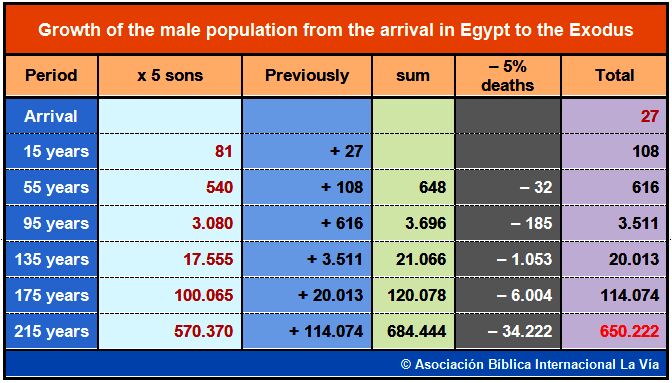
22 Which was
the way followed by the Israelites when they left Egypt? «The people of Israel journeyed from Ramses to Succoth...
When Pharaoh let the people go, God did not lead them on the way of the land of
the Philistines although it was shorter, for He said, “Lest the people repent
when they see they are attacked, and return to Egypt”. And God led the people on
the way of the wilderness of the Red Sea... And they moved on from Succoth,
and encamped at Etham, on the edge of the wilderness, and Yahuh went
before them to lead them along the way, by day in a pillar of cloud, and by
night in a pillar of fire to give them light, that they might travel by day and
by night... Then Yahuh said to Moses, “Tell the people of Israel to turn back
and encamp in front of Pihahiroth, between Migdol and the sea, in front
of Baalzephon; you shall encamp in front of it, by the sea. For Pharaoh will say
of the people of Israel, “They are entangled in the land; the wilderness has
shut them in”. And I will harden Pharaoh's heart, and he will pursue them and I
will glorify myself before Pharaoh and all his host; and the Egyptians shall
know that I am Yahuh”». (Exodus 12:37, 13:17…21,
14:1…4)
The book of Numbers also provides particulars about the path followed
by the people toward the Red Sea: «the people of
Israel departed from Ramses, and encamped at Succoth. Then they
left Succoth, and encamped at Etham, which is on the edge of the
wilderness, but they set out from Etham and turned back towards
Pihahiroth, which is east of Baalzephon; and they encamped before
Migdol. And they set out
from the Pihahiroth area, and walked towards the wilderness, coasting along
the sea; then they made a three days' journey through the wilderness of
Etham, and encamped at Marah. They departed from Marah, and went towards
Elim; there were in Elim twelve water springs and seventy palm trees, and
they encamped there. Then they departed from Elim and encamped by the Red
Sea». (At the northern end of the Gulf of Aqaba) (Numbers 33:5...10)
This map shows the route followed by the Israelites towards the Mount
Sinai in Arabia. («The Sinai is a mountain in
Arabia...» Galatians
4:25)
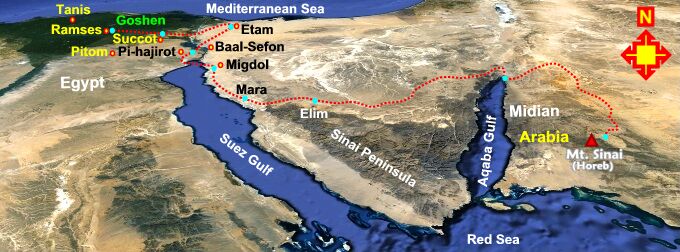
23 When the
Egyptians saw that the Israelites were not returning, went «to the king of Egypt to tell him that the people had fled.
Then the heart of Pharaoh and of his servants turned against the people, because
they said, “What have we done! We have delivered Israel from their service!” So
he made ready his chariot, took his army and six hundred picked chariots with
him, and all the other chariots of Egypt with officers on all of them. And Yahuh let harden the heart of
Pharaoh, king of Egypt, who pursued the people of Israel while they were going
forth exultantly. The Egyptians pursued them, and Pharaoh, with his horses and
chariots and his horsemen and his army, overtook them encamped by the sea at
Pihahiroth, in front of Baalzephon». (Exodus
14:5…9)
When the people saw the Egyptians, feared greatly, but «the angel of Yahuh who was before the camp of Israel,
changed position and moved towards the back, and also the pillar of clouds,
which passed behind and stood between the camp of the Egyptians and the camp of
Israel. The cloud was dark for some, while for the others lit up the night, so
that they could not come near one another throughout the night».
(Exodus 14:19...20)
24 Which was
the place where the people went across the Red Sea? As to this argument,
there are several interpretations; many have pointed out a presumed place, and
even presented the data and maps that we will first
consider.
The first supposed place is the Strait of Tiran in the Gulf of Aqaba,
but if it was so, the people should have had to walk some 500 km to get there, a
distance that for such a large crowd, means a very long journey, a journey of
many days. Moreover, the Strait of Tiran is some 19 km wide, on the other hand, this
theory does not consider the problem of the seabed morphology, which there is
very steep and rugged, completely coated with coral and from 285 to
769
meters deep.
This is a nautical chart of the place:
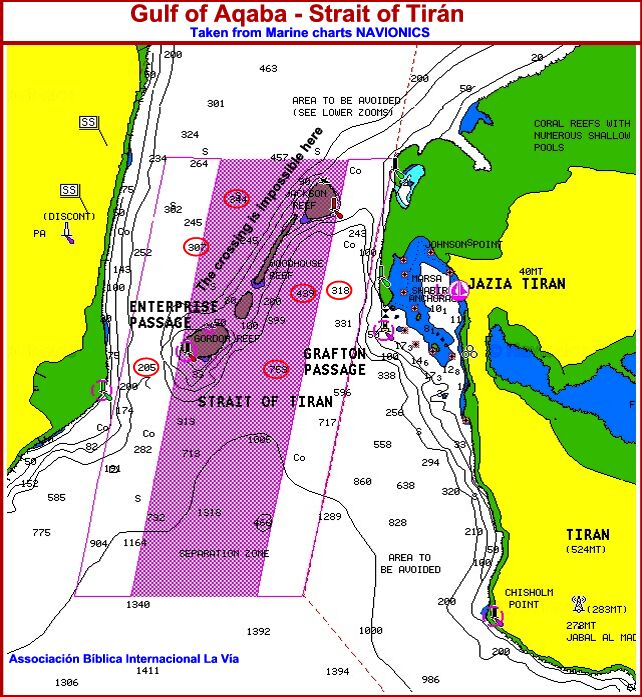
These same arguments override the suggested second place, which is
located in the middle of the Gulf of Aqaba where the width is of almost
24 Km.
Here too, traveling on its seabed would have been impossible. Some have drawn an
hypothetical submerged bridge, but the fact is that in this point, the seabed
depth is from 200 to 799
meters deep, with vertical and steep slopes, as
illustrated on the next nautical chart.

25 In order to find the correct coordinates of the described site, we must
trust the biblical narrative. In the book of Exodus we read: «God led
them on the path of the wilderness along the Red Sea ... Then Yahuh said to
Moses, “Tell the people of Israel to go back and encamp before
Pihahiroth, between Migdol and the sea in front of Baal-Zephon,
and you shall encamp by the sea”». (Exodus 13:18,
14:1…2)
So the site were Yahuh divided the waters and opened a path for his
people, who crossed the sea on firm ground, walking between two walls of water
and arriving safe on shore, while Pharaoh's army vanished into the sea, is
located in the northern Red Sea, on the Gulf of Suez.
In the next nautical chart, ignoring the Suez channel built between
1859 and 1869, we can see that the seabed is practically flat that and its depth
varies from 4.5 to 6.7
meters, being deep enough to immerse Pharaoh’s army and
all his chariots.
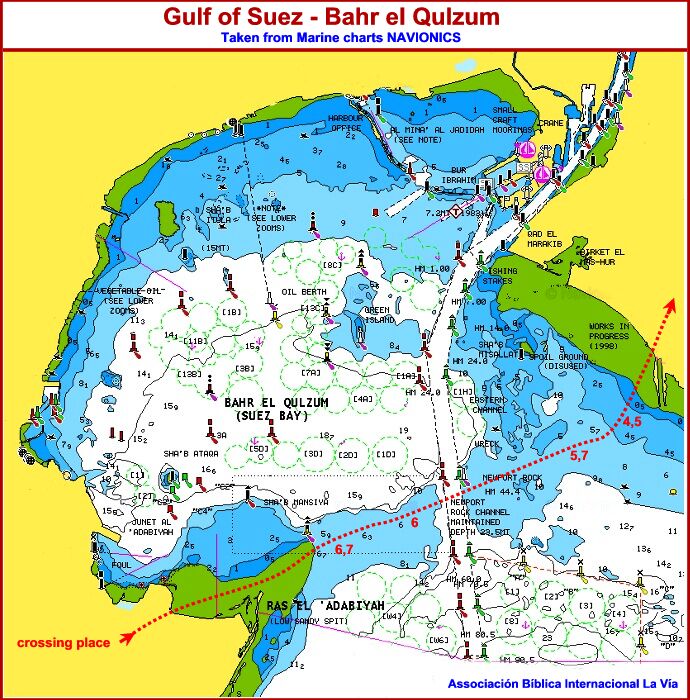
Moreover, and despite of what some may say, even if Pharaoh sent his
army in pursuit of the people, he did not enter the sea; as the head of
the army, he remained where he could see the development of what was happening
and the expected result of the pursuit. When Scripture says that «the waters returned and covered the chariots and the
horsemen of all the army of Pharaoh, entered in the sea behind them»
(Exodus 14:28), it does not say that the waters covered the pharaoh
with his army. Paul confirms this fact, when recalling these works
wrought by God for his people, says: «As
it is written, he says to Pharaoh: In fact, I have kept you alive to show
you my power and that my name be known all over the earth». (Romans
9:17) Even if on the book of Psalms we read that God «shook the Pharaoh and his host in the Red Sea»
(Psalm 136:15) this sentence does not say otherwise, since it only states
that in the Red Sea, God humiliated and defeated Pharaoh and his great
army.
26 The fact that
the Pharaoh of the Exodus lost all his army also points to Thutmose I. The
conflicts related to the departure of the Israelites took place on the eleventh
year of his reign, and after these events, since his firstborn Amenmoses was
dead, Thutmose I appointed heir to the throne to his daughter Hatshepsut, and died soon after. However, and because
of the reluctance of the priesthood, the succession was attributed to
Hatshepsut's young half-brother, the son of the secondary wife Mutnofret, who in
order to consolidate his governing rights, married her and reigned with the name
of Thutmose II. Since then, no more news of military maneuvers for many years.
In the first year of his reign, Tuthmosis II had to face a revolt in Nubia, but
as he was unable to send the army that his father lost in the Red Sea,
commissioned Kummeh Seni, the superintendent of the southern lands, whom he
appointed viceroy of Nubia. Thutmose II died and was succeeded by his wife
Hatshepsut; under her administration there were only commercial expeditions to
the south, in search of exotic materials such as scented wood and gold. During
this period, her stepson, the future pharaoh Thutmose III, devoted himself to
military affairs and to the preparation of an army, which in the years following
the death of Hatshepsut, provided the basis of the military operations he
carried out.
27 After they
crossed the Red Sea, the Israelites camped at the following locations: Migdol,
Mara and Elim, and traveling across the wilderness of the Sinai Peninsula,
encamped by the Red Sea, in the northern part of the Gulf of Aqaba; and after
having coasted the gulf through the land of Midian, they came in front of the
mountains of Sinai and Horeb in Arabia, where God
established through Moses, the Law Covenant with his
people.
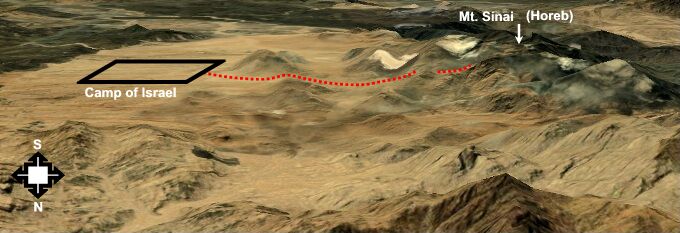
Despite being witnesses of the mighty works performed by Yahuh, the
sons of Israel frequently revealed themselves rebellious and lacking in faith;
for this reason none of them, except for Joshua and Caleb, entered the promised
land. In the book of the Acts we find an inspired account of Stephen, which
summarizes what happened, he says: «This Moses whom they refused, saying, “Who
made you a ruler and a judge?” Was sent by God as both ruler and deliverer by
the hand of the angel that appeared to him in the bush. He led them out, having
performed wonders and signs in Egypt, in the Red Sea and in the wilderness, for
forty years. This is the Moses who said to the Israelites, “Your God will raise
for you from among your brothers, a prophet like me. Listen to him!” This is he
who in the assembly on the wilderness, went with the angel who spoke to him at
Mount Sinai, and with our fathers, and who received words of life to give them
to us.
Our fathers did not want to obey him, because they refused him and in
their hearts wished to return to Egypt; they said to Aaron, “Make for us gods to go before us; as for this
Moses who led us out from the land of Egypt, we do not know what has become of
him”. And
in those days, they made a calf and offered a sacrifice to the idol, rejoicing
in the works of their hands». (Acts
7:35...41) Because of their continuous revolt, the people wandered
through the wilderness for forty years, until that after the death of Moses the
new generation entered the promised land with Caleb and
Joshua.
The things that happened then to the people of God, are examples and
warnings for the people of God living on the final days of this world, compared
in Scripture to the Egypt of Moses time. Paul says: «In fact, Moses was a faithful servant in the house of God,
to bear witness of the things that were to come, while Christ is over the house
like a son, and we are his house, that is if we maintain our freedom
of expression and the joy for the hope. Therefore, as the Holy Spirit says:
“Today, if you hear his voice, do not become stubborn as on the day of the
rebellion, the day of the provocation in the wilderness, when your fathers
provoked me, testing me despite they saw my works for forty
years. This generation disgusted me, and I said: “Their heart remains
wicked, they have not come to know my ways”. And so, I swore in my indignation,
“They shall not enter my rest”,
Be
watchful, brethren, that in any of you may arise an evil heart and lacking in
faith, that drives you away from the living God. Keep on exhorting each other every day, until you can say “Today”, so
that none of you may become obstinate through the seductive power of sin,
because we can only be partakers with Christ if we really hold steadily until
the end, the same confidence that we proved in the
beginning». (Hebrews 3:5...14)
(1) (Hicsos, from
the Greek word: Ὑκσώς, from the Egyptian  hq3 ḫ3stw Heka khaset)
hq3 ḫ3stw Heka khaset)